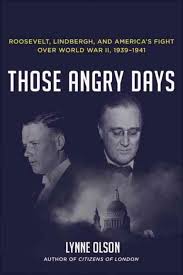Anyone who finds today’s political climate too divisive and longs for the civility of earlier times would be well-served by full immersion in historian Lynne Olson’s most recent venture, Those Angry Days, which chronicles in lively, absorbing detail the climate in the United States in the two years before it entered the war. As in her earlier, excellent Citizens of London: The Americans Who Stood With Britain in its Darkest, Finest Hour, Olson presents a vast, compelling cast of characters full of passionate conviction. Front and center are the men of the title: Franklin Roosevelt who, though derided by his enemies as a “dictator,” was often worryingly reliant on public opinion as parsed for him by the pollsters, and Charles Lindbergh, a proud, private man who could not keep himself out of the limelight except when he was 10,000 feet above it.
As countries swiftly fell to Hitler, leaving only England as the last hope of freedom in Europe, Americans faced the critical question of what the role of the nation was to be in this turbulent world. The isolationists argued that Britain and France (who had dragged us into World War I, which was supposed to have made the world safe for democracy and had instead cost 50,000 American lives) had “repeatedly demonstrated an inability to settle their own disputes . . . we must be ready to fight for the defense of our own nation, but for nothing and no one else.” The interventionists held that too much was at stake for America to evade its international responsibility: Hitler was intent on world domination and we would face him eventually, and how could we stand by as Nazi Germany “threatened to wipe out Western civilization as we know it?”
“As momentous as it was, the passionate prewar battle over America’s destiny has largely disappeared from the national memory,” Olson writes, and goes on to quote General George Marshall: “People have forgotten the great hostility of that time.”
How hostile was it? A debate over conscription came to blows on the floor of the House of Representatives. During the presidential campaign of 1940, Republican candidate Wendell Willkie was “pelted with everything from rotten eggs, fruits, vegetables, rocks and lightbulbs to an office chair and wastebasket . . . The New York Times ran a daily box score of the number of items thrown and those that found their target.”
As aid to Britain was eked out both by private committees and cautious, narrow legislation (the Destroyers for Bases act, the Lend-Lease act), coalitions opposing Roosevelt’s foreign policy sprang up across the country. The most prominent one was founded at Yale, where students including Mayflower descendent Kingman Brewster (future U.S. ambassador to Britain), Sargent Shriver (future head of the Peace Corps), McGeorge Bundy (future National Security Advisor), and Potter Stewart (future Supreme Court justice) founded America First to provide a “rallying point for resistance” against “being stampeded into war by the Roosevelt administration.” America First’s somewhat elitist origins were given huge financial support by the captains of industry who made their fortunes providing for middle America – men like Sterling Morton (of the salt), Jay Hormel (of the meat), Henry Ford, and the founder of Quaker Oats. The darling and spokesman of America First was Charles Lindbergh, whose speeches at their rallies attracted thousands of supporters and protesters.
When war finally was declared, Lindbergh’s offer of services was initially shunned by both the military and private industry, who were afraid of being associated with him. Henry Ford took him on as a technical consultant; Lindbergh advised on the B-52 and the P-47 fighters. Eventually, he served as a civilian consultant in the Pacific without the knowledge of the White House. As a civilian combatant, he flew fifty combat missions while “squadron leaders . . . looked the other way.”
Lindbergh is merely the most prominent “character” in this history which includes deft, thorough portrayals of Wendell Willkie, the British ambassador Lord Lothian, Robert McCormick, the Anglophobic publisher of the Chicago Tribune, J. Edgar Hoover who, at Roosevelt’s orders, launched his phone-tapping career by targeting isolationists, and the sophisticated yet naïve, suffering yet oblivious Anne Morrow Lindbergh. Olson’s prodigious research is matched only by her intellectual curiosity. This is a hefty tome but well worth the read; you couldn’t possibly be in better hands.
Those Angry Days: Roosevelt, Lindbergh, and America’s Fight Over World War II
1939-1941
Lynne Olson
History, Random House, 2013
576 pages
